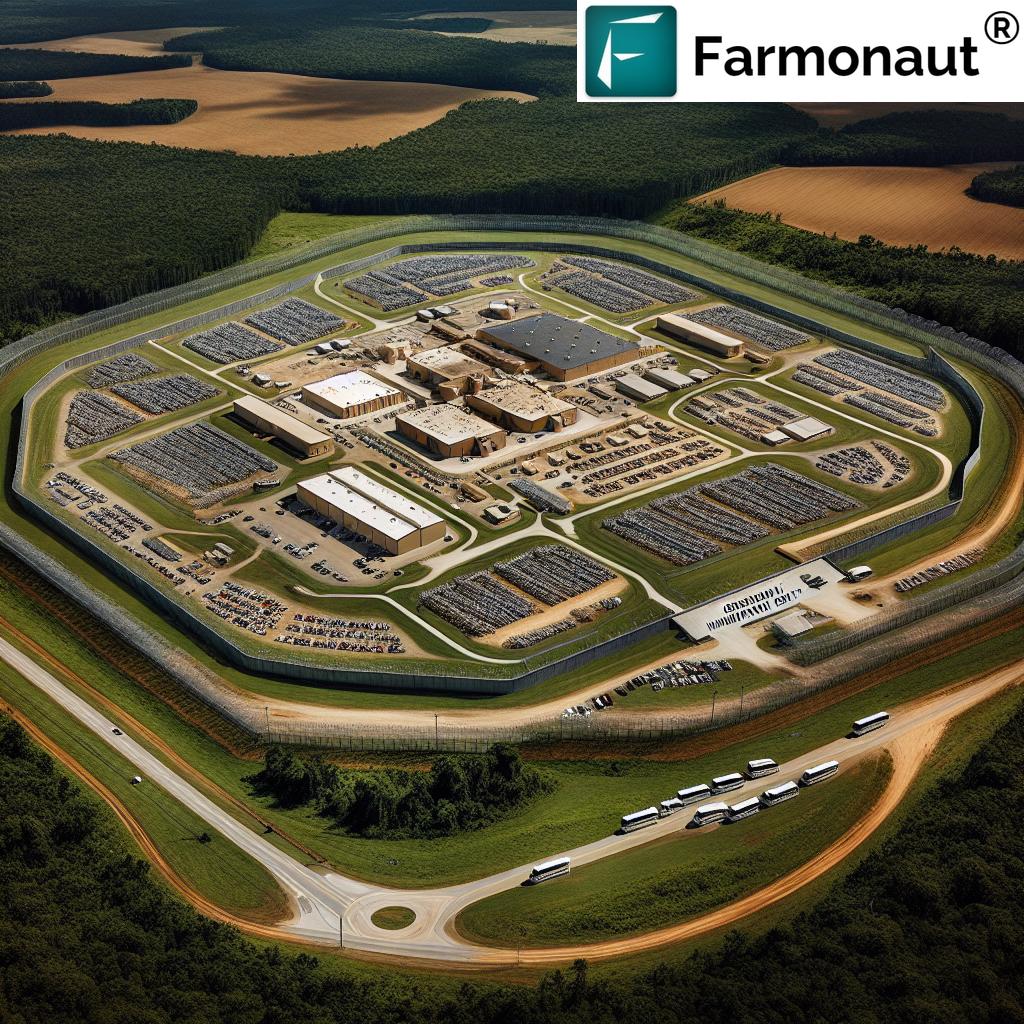Louisiana Immigration Detention: 7 Shocking Facts on Overcrowding & Courts
Introduction: Louisiana’s Undeniable Role in Nationwide Immigration Detention
In the heart of rural Louisiana, tucked among crawfish farms and pine forests, the US immigration detention system is operating at a scale and intensity few Americans realize. While much of the media focus dwells on border states like Texas, Louisiana detention centers now hold more immigrants than any other state except Texas and California. The southern rural landscape—seemingly remote from the national border—has become the very epicenter of the nationwide deportation system, with its expanding capacity, controversial facilities, and increasing use by the government and private companies.
As we explore these seven shocking facts about immigration detention centers in Louisiana, we must confront urgent questions: Why is rural Louisiana a hub for immigrant detention? How have court conditions and overcrowding become so severe? And what impact does the explosive expansion of detention have on our nation, from the justice system to families waiting—sometimes for years—for answers?
The Explosive Expansion of the US Deportation System: A National Crisis
The US immigration detention capacity is growing at a rate unmatched anywhere else in the world, driven by government directives, private prison contracts, and policy changes advocated by the Trump administration and previous presidencies. President Trump’s 2024 campaign promises and current strategies have put nationwide immigration enforcement and overcrowding in detention centers into the spotlight.
According to the Immigration and Customs Enforcement agency (ICE), contracts for expanding detention capacity could total $45 billion nationwide. The agency currently operates more than 100 centers across the country, with a budget for roughly 41,000 beds. However, with awarded and planned contracts, that capacity could jump to 100,000 beds—effectively doubling the physical space for holding immigrants.
Some of the largest private prison companies—Geo Group Inc. and CoreCivic Inc.—have seen their stock prices soar, reaping enormous profits from contracts in places like Texas, Louisiana, New Jersey, and Michigan. Many of these new immigrant detention facilities in Texas and beyond are miles—even hours—from the closest cities, raising concerns about the isolation of detainees from lawyers, families, and legal resources.
1. Louisiana Is a National Epicenter for Immigration Detention
When most think of US immigration detention, border states like Texas, Arizona, or California come to mind. Yet, Louisiana—a state neither dense with immigrants nor directly on the US-Mexico border—has rapidly become the second-largest holder of detained immigrants in the country, eclipsed only by Texas itself.
- ICE’s Strategic Shift: In just one year, ICE converted five former criminal jails across rural north and western Louisiana into immigration detention centers. This shift took advantage of lower labor costs, emptied facilities due to reduced criminal penalties, and local willingness to sign new private prison contracts.
- Capacity Surges: Today, the combined detention capacity in Louisiana facilities holds over 8,000 immigrants at any given time, with numbers climbing as the government’s ambitions grow.
- Economic Drivers: For many rural parishes, prisons remain a central economic engine. With local jobs dependent on these jails, resistance is rare—and government agencies meet little opposition as they expand.
This transformation has made rural Louisiana a critical—if often invisible—node in the US deportation system.
2. Overcrowding in Detention Centers: Beyond Maximum Capacity
One of the most persistent and alarming issues in Louisiana immigration detention centers is overcrowding. With more people coming into the system and the state’s available beds rarely meeting demand, detainees can be forced to live in conditions described by advocates as squalid or dangerously packed.
- Frequent Surges: Louisiana’s large facilities routinely operate beyond their official capacity due to nationwide immigration enforcement drives and changing budget allocations. ICE’s expanding contracts channel more detainees here while alternatives—such as supervised release—remain scarce.
- Health Risks: With every available bed filled (and often more), sanitary and safety concerns are amplified. Complaints range from lack of access to medical care, to insufficient food, to outbreaks of illness that spread rapidly in cramped conditions.
- Isolation Exacerbated: Overcrowding not only strains facilities—it further isolates detainees, making individual needs and legal recourse harder to address.
Our nation’s deportation system has created a scenario where practical and humanitarian boundaries are pushed daily.
3. The Role of Rural Louisiana Prisons and Jail Space in ICE Expansion
Unlike in major cities, where legal representation and support networks are close by, ICE has purposely selected rural Louisiana prisons—often repurposed local jails or criminal facility space—for immigrant detention.
- Low-Cost Opportunity: After 2017, when state laws reduced criminal penalties, fewer inmates were incarcerated, leaving jails empty and communities economically reliant on their operation. ICE found ready partners in rural parishes eager to fill the void.
- Political Climate: As ACLU Louisiana’s legal director notes, the region’s political orientation leans toward support for increased incarceration and prison-based infrastructure.
- Deliberate Distance: By holding immigrants in rural areas, ICE increases the difficulties detainees face in reaching lawyers, families, and media—a fact often criticized by advocacy groups.
The result is a sprawling network of immigration detention centers placed strategically far from population centers, intensifying the sense of isolation.
Comparative Data Table: Louisiana Detention Centers, Overcrowding & Court Conditions
To appreciate the scale of overcrowding in detention centers and delays in immigration court conditions, here is a comparative data table illustrating critical metrics for major Louisiana detention centers. This snapshot reveals the urgency of both operational and humanitarian issues within our nation’s growing deportation system.
| Facility Name | Estimated Capacity | Est. Current Population | % Over Capacity | Avg. Length of Stay (days) | Court Sessions/Month | Avg. Days to 1st Court Appearance |
|---|---|---|---|---|---|---|
| LaSalle ICE Processing Center (Jena) | 1,200 | 1,550 | +29% | 64 | 55 | 47 |
| Richwood Correctional Center (Monroe) | 900 | 1,170 | +30% | 73 | 40 | 49 |
| Jackson Parish Correctional Center | 1,200 | 1,350 | +13% | 55 | 45 | 41 |
| Pine Prairie ICE Processing Center | 1,100 | 1,350 | +23% | 102 | 35 | 56 |
| South Louisiana ICE Processing Center | 1,000 | 1,300 | +30% | 98 | 38 | 53 |
Interpretation: This table demonstrates patterns of persistent overcapacity at major immigrant detention facilities. Average time to first court appearance frequently exceeds six weeks—a delay that often leaves detainees languishing in isolation, unable to access timely legal support.
Explore Farmonaut’s carbon footprinting tools — These enable agribusinesses and government agencies in states like Louisiana and Texas to track and reduce environmental impact of rural operations, ensuring greater sustainability in agriculture and detention infrastructure management.
4. Jena and Remote Rural Detention—A Strategic (and Controversial) Choice
The small rural community of Jena, Louisiana—surrounded by forests and with only one hotel to its name—hosts one of the state’s most prominent immigration detention centers. The LaSalle ICE Processing Center, run by the Geo Group, is fortified by barbed wire and guards, reflecting a nationwide model.
- Strategic Isolation: The distance from cities such as New Orleans (about 220 miles away) means lawyers, legal aid groups, and families must travel hours for visits or court hearings.
- Psychological Toll: According to advocates, the deliberate siting of detention in remote areas increases psychological stress and helps the agency achieve faster compliance—many stop fighting their cases simply due to despair and logistical hardship.
- Challenges to Oversight: The remoteness of such facilities makes oversight—by media, lawmakers, or advocacy organizations—exceedingly difficult. This reduces the likelihood of rapid policy or conditions reform.
Jena is far from alone—across rural Louisiana and Texas, this detention model is being replicated as private companies are awarded lucrative, long-term contracts.
Enhance transparency in supply chains and facility management with Farmonaut Traceability Solutions. Blockchain-powered traceability increases transparency, reduces fraud, and builds trust in both agricultural and rural detention operations nationwide.
5. Immigration Court Conditions: Western Louisiana’s Unique Legal Hurdles
The nature of the legal system in western and north Louisiana—with highly conservative federal courts and one of the most backlogged immigration dockets nationwide—compounds detainees’ plight.
- Backlogged Dockets: Local courts, especially in Alexandria and other parishes, carry case backlogs in excess of 10,000. Detainees are sometimes left waiting years, well beyond recommended standards for due process.
- Remote Video Hearings: Although technology like video links is increasingly available, many advocates describe the process as “dehumanizing” and argue that physical separation reduces the fairness and empathy needed in high-stakes deportation hearings.
- Local Legal Desert: Most lawyers and immigration specialists cluster in cities hundreds of miles away, leaving those in rural jails without adequate representation. This power imbalance directly benefits enforcement agencies seeking efficiency.
Ultimately, the system stacks the deck against immigrants detained in remote Louisiana, with slow courts and limited access to legal aid.
Discover Farmonaut’s satellite verification for crop loans & insurance. By enabling credible, real-time verification, this tool reduces fraud and eases access to financing for farmers and agricultural communities across Louisiana, Texas, and beyond.
6. Private Prison Contracts and Companies: The Business Behind Detention Expansion
The expansion of US immigration detention capacity across the nation—and particularly in Louisiana and Texas—has been a windfall for two main private operators: Geo Group Inc. and CoreCivic Inc..
- Record Profits: Since Trump’s election and renewed focus on immigration enforcement, stock prices for these companies have soared, with major contracts ranging from $1 to nearly $4 billion.
- Flexible Contracts: New models often include long-term, high-value commitments with options to scale up holding capacity rapidly as nationwide budget priorities shift.
- Strategic Facility Placement: These companies are experts at transitioning criminal jail infrastructure in rural areas into detention centers for immigrants, maximizing both asset use and distance from oversight bodies.
Our nation’s system for holding immigrants is increasingly driven by the calculus of private profit, not just public need.
Improve rural logistics and operational efficiency with Farmonaut’s Fleet and Resource Management Tools. From prison logistics to agriculture operations in Louisiana, these AI-powered tools optimize asset use and reduce operational costs.
7. Systemic Legal Barriers and the Impact on Detained Immigrants
The combination of overcrowding, rural isolation, and systemic legal barriers creates a challenging—often insurmountable—environment for immigrants facing deportation in Louisiana.
- Limited Legal Access: With lawyers centered in distant cities, and many facilities restricting communication, detainees often appear in court alone or with minimal help.
- Harsh Local Case Law: The 5th U.S. Circuit Court of Appeals and local federal judges have set tough precedents, making it harder for detainees to challenge conditions or deportation orders.
- Mental and Emotional Toll: The threat of fast, Amazon-like deportation processes—as highlighted by ICE’s own leadership—creates additional stress and fear among detainees, often resulting in hasty, unadvised decisions.
This combination of factors is central to why Louisiana immigration detention centers have become widely criticized by civil rights organizations and humanitarian advocates.
For organizations and agencies managing large tracts of land or coordinating resources in rural states, Farmonaut’s Large Scale Farm Management Solution offers an integrated platform for real-time, data-driven decisions—boosting both agricultural productivity and transparency in facility management.
Farmonaut: Revolutionizing Monitoring of Rural Areas—From Agriculture to Facility Transparency
As we reflect on the rural dynamics making Louisiana and Texas prime hubs for immigration detention centers, it’s instructive to consider how technology is transforming oversight, transparency, and resource management in rural sectors nationwide.
Farmonaut—an advanced provider of satellite-based agricultural and facility management tools—proves how breakthrough technologies can raise standards, drive sustainability, and empower users in even the most remote regions. The company’s platform, available on Android, iOS, web app, and API, equips users with real-time analytics on:
- Crop health and vegetation monitoring using multispectral satellite imagery
- AI-driven advisory for better resource allocation
- Blockchain-based traceability for transparency and trust
- Fleet management—improving logistical operations for both agricultural and rural facility operations
By leveraging these tools, both private companies and government agencies can make fact-based decisions—whether managing farms in the rural north or monitoring the conditions of remote jails and detention centers.
Maximize efficiency, yields, and compliance in plantation management with Farmonaut’s AI-based Crop Plantation & Forest Advisory—Trusted by agriculture professionals and institutions who manage vast rural operations in Louisiana, Texas, Montana, and beyond.
Towards Sustainability and Transparency: The Path Forward in Rural Louisiana
Increasing transparency and strengthening oversight—using both policy and technology—are key to addressing many concerns plaguing immigration detention centers and other rural facilities. Farmonaut’s innovations highlight practical pathways for:
- Reducing Carbon Impact: Real-time tracking of carbon emissions supports compliance and sustainability for businesses and public agencies.
- Securing Supply Chains: Blockchain technology brings verifiable transparency to commodity traceability, critical in humanitarian environments and agriculture alike.
- Remote Management: Satellite-based and AI-driven solutions enable agencies to monitor facility or farm conditions, even in rural or isolated regions.
We believe that empowering oversight—from crop fields to detention centers—creates better outcomes for all stakeholders, especially those most vulnerable to system failures.
Pull advanced multispectral and weather data for rural monitoring, facility compliance, and agri-analytics anywhere in the country.
Developer Documentation
Farmonaut Subscription Pricing
Choose from flexible Farmonaut subscriptions for crop health monitoring, traceability, and rural resource management. See details below:
Frequently Asked Questions (FAQ)
What are the main reasons Louisiana has become a hub for immigration detention?
Louisiana’s rural geography offered recently emptied jails and a pro-incarceration political climate, making it a top target for ICE as it expanded capacity nationwide. Lower labor costs and expedited contracts with private prison companies further accelerated the shift.
How severe is overcrowding in Louisiana immigration detention centers?
Many facilities routinely operate 10-30% above official capacity. Overcrowding leads to insufficient access to health care, higher risk of disease, and extended legal delays for detainees.
How do court conditions affect detainees in rural Louisiana?
Backlogged courts, lack of local lawyers, and remote video appearances mean immigrants can face months or years waiting for their cases to be processed, often with little access to legal aid or family support.
What role do private companies play in the detention system?
Companies such as Geo Group and CoreCivic operate many ICE facilities under long-term, high-value contracts. Their influence has shifted the detention business model toward profit-driven expansion, often in remote or rural areas.
How can technology enhance transparency and sustainability in rural operations?
Technologies like Farmonaut’s satellite monitoring, AI advisory, and blockchain traceability provide actionable data to optimize facility management, reduce environmental impact, and introduce greater accountability in both agriculture and rural detention systems.
Conclusion: What Can We Do Next?
Our investigation into Louisiana immigration detention centers exposes a host of critical social issues: chronic overcrowding, severe court delays, profit-driven expansion, and the deliberate isolation of immigrants in remote rural areas. These facts demand renewed attention from policy makers, advocates, and every citizen concerned with justice and humanitarian values.
The same technologies transforming agriculture across Louisiana, Texas, and Montana—from satellite crop health monitoring to blockchain-based transparency—can play a role in bringing accountability and sustainability to our detention infrastructure. As we press for legal reform, improved oversight, and greater compassion, let us also embrace data-driven solutions that shine a light on even the most remote corners of our nation’s system.
For more information about deploying monitoring and traceability technology in rural environments, learn about Farmonaut’s full suite of precision agriculture, resource management, and compliance solutions.








